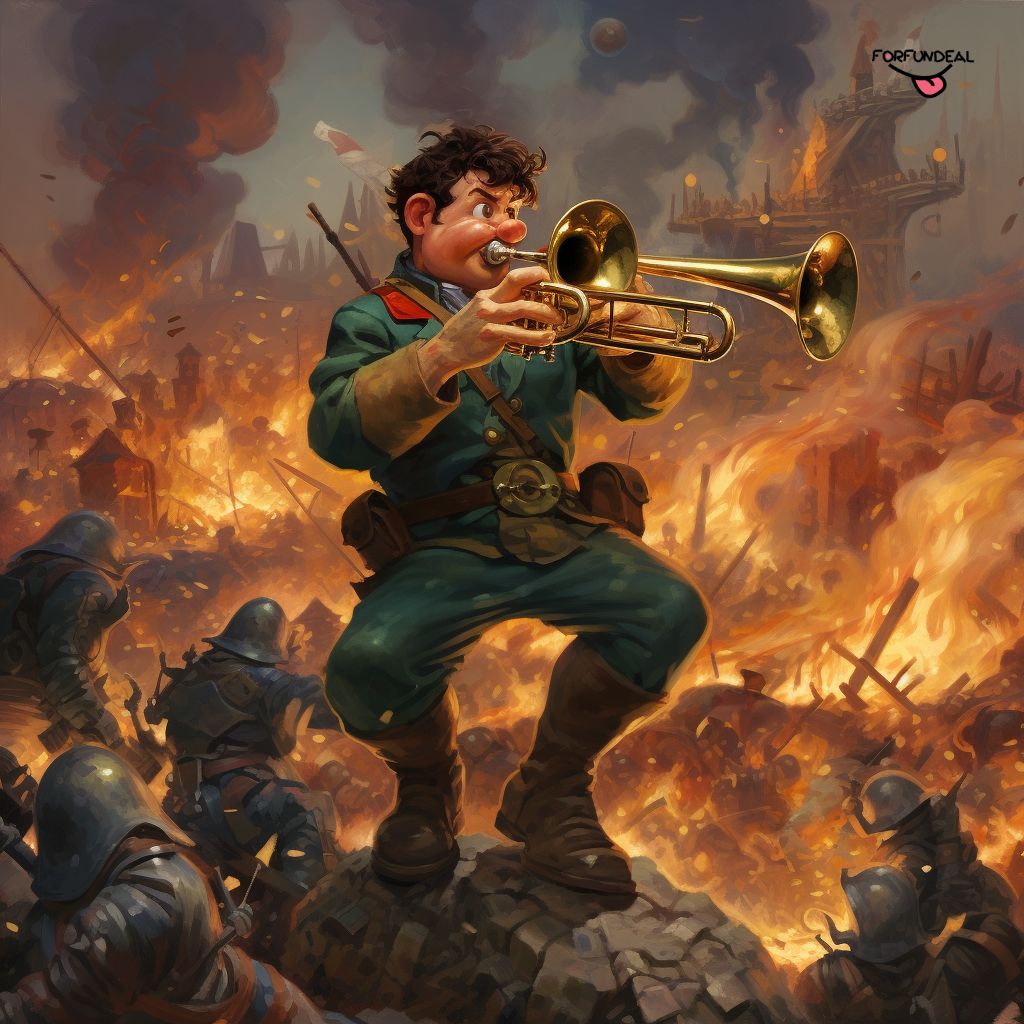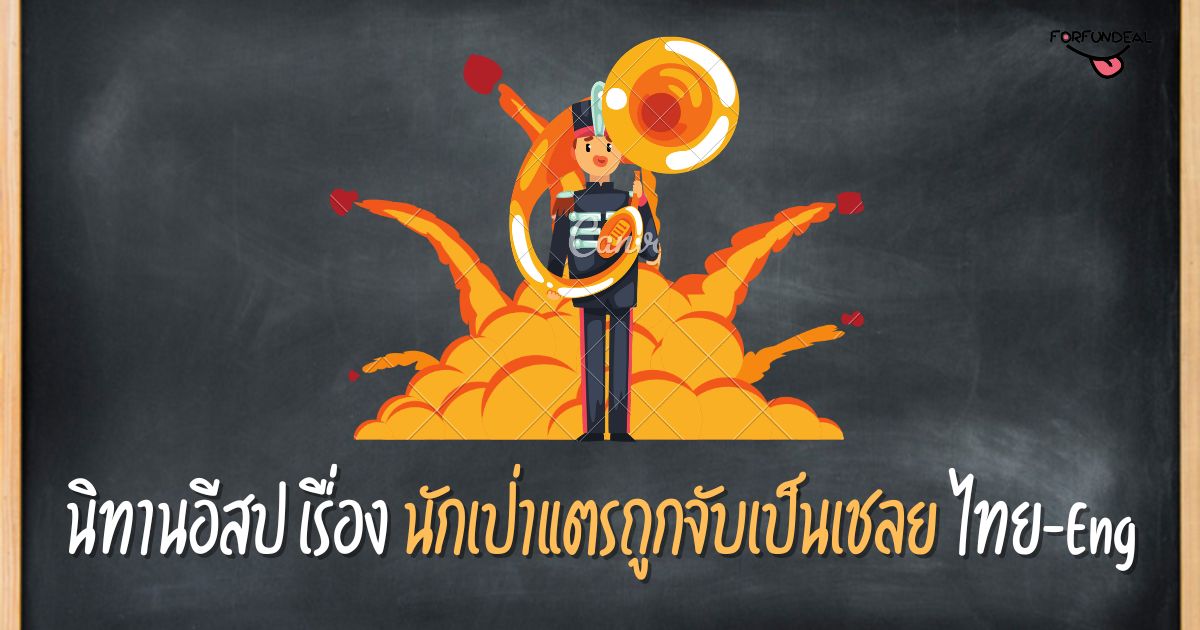“นักเป่าแตรถูกจับเป็นเชลย” เป็นนิทานอีสปที่นักเป่าแตรที่ถูกจับในสนามรบได้เรียนรู้ว่าบทบาทของเขาในการยุยงให้เกิดความขัดแย้งนั้นส่งผลทางอ้อม โดยเน้นย้ำถึงความรับผิดชอบของผู้ที่มีอิทธิพลต่อผู้อื่นในความขัดแย้ง
นิทานอีสปเรื่องนักเป่าแตรถูกจับเป็นเชลย
กาลครั้งหนึ่งนานมาแล้ว มีสงครามท่ามกลางการต่อสู้อันดุเดือด นักเป่าแตรคนหนึ่งพบว่าตัวเองตกอยู่ในภาวะคับแค้นใจ เขาถูกจับโดยทหารศัตรูซึ่งต่างจากเขาตรงที่ถือดาบและโล่ คนเป่าแตรด้วยความสิ้นหวังที่จะไว้ชีวิต เขาจึงอ้อนวอนกับผู้จับกุมว่า “ข้าเป็นเพียงคนเป่าแตรผู้ต่ำต้อย และไม่มีอาวุธสงคราม ไว้ชีวิตข้าเถอะ เพราะข้าไม่ได้ทำให้ใครเลือดไหลในสนามรบเลย”
Once upon a time, There is the war in the midst of a fierce battle, a trumpeter found himself in dire straits. He was captured by the enemy soldiers, who, unlike him, bore swords and shields. Desperate to spare his life, the trumpeter pleaded with his captors, “I am but a humble trumpeter, carrying no weapons of war. Spare me, for I have not spilled blood on the battlefield.”
อย่างไรก็ตาม ทหารศัตรูไม่มั่นใจในการปกป้องตัวเองของเขา หนึ่งในนั้นตอบอย่างเคร่งขรึมว่า “บทบาทของเจ้าในฐานะนักเป่าแตรนั้นไม่ได้ไร้ผลใดๆ ทั้งสิ้น ด้วยการเล่นเครื่องดนตรีนั้น เจ้าได้ปลุกระดมนักรบจำนวนนับไม่ถ้วนให้ออกรบ ปลุกเร้าความกล้าหาญและความมุ่งมั่นของพวกเขา เสียงดนตรีของเจ้าเป็นเหมือนเสียงร้องจากอาวุธ ทำนองแห่งความขัดแย้ง ถึงเจ้าไม่ได้ถือดาบ แต่เจ้าเป็นเครื่องมือในการทำสงครามและนั่นก็แบกความผิดของตัวเองด้วยเช่นกัน” และทหารอีกคนกล่าวเสริมว่า “เครื่องดนตรีของเจ้าสนับสนุนให้ผู้อื่นเข้าร่วมการต่อสู้ ทำสงคราม และเสี่ยงชีวิตของพวกเขา ในบางแง่ การกระทำของเจ้าอาจ ยิ่งกว่าคนถืออาวุธเสียอีก”
The enemy soldiers, however, were not convinced by his defense. One of them sternly replied, “Your role as a trumpeter is not without its consequences. By playing that instrument, you have incited countless warriors to battle, stirring their courage and resolve. Your music has been the call to arms, the melody of conflict. You may not wield a sword, but you have been an instrument of war, and that, too, carries its own guilt.” And another soldier added “Your instrument encourages others to join the fight, to wage war, and to risk their lives. In some ways, your actions may be even worse than those who wield weapons.”
เมื่อตระหนักถึงความจริงในคำพูดของพวกเขา คนเป่าแตรจึงเข้าใจว่าการกระทำของเขาแม้จะโดยอ้อม แต่ก็มีบทบาทสำคัญในความรุนแรงที่เกิดขึ้น เขามีส่วนทำให้เกิดความวุ่นวายและความทุกข์ทรมานในสนามรบ
Realizing the truth in their words, the trumpeter understood that his actions, though indirect, had played a significant role in the violence that had unfolded. He had contributed to the chaos and suffering of the battlefield.

นิทานเรื่องนี้สอนให้รู้ว่า
“การมีส่วนทำให้เกิดอันตรายหรือความขัดแย้งทางอ้อมสามารถมีความรับผิดชอบได้พอๆ กับการกระทำโดยตรง”
- ความรับผิดชอบต่อการกระทำ: เรื่องราวนี้สอนเราว่าแม้แต่การกระทำทางอ้อมก็อาจส่งผลที่ตามมาที่สำคัญได้ เราควรคำนึงถึงผลกระทบที่การเลือกของเรามีต่อผู้อื่นและรับผิดชอบต่อพวกเขา
- พลังแห่งอิทธิพล: อิทธิพลไม่ว่าจะผ่านทางคำพูด ดนตรี หรือวิธีการอื่นๆ สามารถกำหนดเหตุการณ์และพฤติกรรมได้ เราควรใช้อิทธิพลของเราอย่างมีความรับผิดชอบและคำนึงถึงผลกระทบที่อาจเกิดขึ้น
- ผลที่ตามมาของอิทธิพล: บทบาทของนักเป่าแตรในฐานะผู้สนับสนุนผู้อื่นผ่านดนตรีของเขาเน้นย้ำถึงพลังแห่งอิทธิพลและความรับผิดชอบทางจริยธรรมที่มาพร้อมกับอิทธิพลนั้น
- การตัดสินใจอย่างมีจริยธรรม: เรื่องราวเน้นย้ำถึงความสำคัญของการตัดสินใจอย่างมีจริยธรรม แม้แต่ในบทบาทที่อาจดูเป็นเรื่องรองก็ตาม เป็นการเตือนใจว่าตัวเลือกของเราควรสอดคล้องกับค่านิยมและหลักการของเรา
- ตระหนักถึงผลที่ตามมาโดยไม่ตั้งใจ: บางครั้งเราอาจไม่เข้าใจผลที่ตามมาโดยไม่ตั้งใจจากการกระทำของเราอย่างเต็มที่จนกว่าจะสายเกินไป สิ่งสำคัญคือต้องคาดการณ์และพิจารณาผลที่ตามมาเหล่านี้ก่อนตัดสินใจเลือก
“Indirect contributions to harm or conflict can be just as responsible as direct actions.”
- Accountability for Actions: This story teaches us that even indirect actions can have significant consequences. We should be mindful of the impact our choices have on others and take responsibility for them.
- The Power of Influence: Influence, whether through words, music, or other means, can shape events and behavior. We should use our influence responsibly and consider its potential effects.
- Consequences of Influence: The trumpeter’s role as an encourager of others through his music highlights the power of influence and the ethical responsibilities that come with it.
- Ethical Decision-Making: The story highlights the importance of ethical decision-making, even in roles that may seem secondary. It’s a reminder that our choices should align with our values and principles.
- Recognizing Unintended Consequences: Sometimes, we may not fully grasp the unintended consequences of our actions until it’s too late. It’s crucial to anticipate and consider these consequences before making choices.
โดยสรุปแล้วนิทานเรื่องนี้ทำหน้าที่เป็นเรื่องราวเตือนใจ กระตุ้นให้เราไตร่ตรองถึงผลกระทบทางจริยธรรมจากการกระทำของเรา และอิทธิพลที่เราใช้ ไม่ว่าจะผ่านคำพูด ดนตรี หรือวิธีการอื่นๆ

